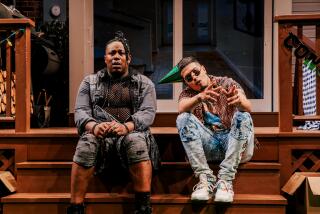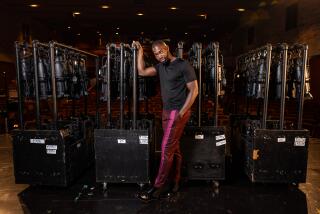A play with practically no talking? In Bess Wohl’s ‘Small Mouth Sounds,’ silence is sweet
A minute of silence onstage feels like an eternity. So imagine what 100 minutes of silence would feel like. That’s exactly what playwright Bess Wohl did when she set out to write “Small Mouth Sounds,” which makes its Los Angeles-area debut at the Broad Stage on Thursday.
Set at a silence retreat in the woods, the play explores the lives of six people as they struggle to connect, and find inner peace, without uttering a word. The play has a few moments of speech, but the only substantial dialogue comes from the person running the retreat — a bodiless voice offstage.
For a writer who admits to relying on witty banter for some of her best work, the play proved a dramatic challenge and a creative triumph for Wohl and director Rachel Chavkin, the latter fresh off the raves she earned on Broadway for her inventive “Natasha, Pierre & the Great Comet of 1812.”
As part of a national tour that will take “Small Mouth Sounds” to Dallas, Miami and Philadelphia, Wohl talked with The Times about her process and explained why silence is sometimes louder than words.
What made you want to write this play?
The idea came when I was on a silence retreat. I had been — I wouldn’t say dragged — but encouraged to come by a close friend. I didn’t realize we were going to be in silence. I thought it was going to be a girls bonding weekend. I brought snacks and wine.
But on the first night of silence I simultaneously realized, “Wow, this might be fertile ground for a play.” I had this impulse based on observing other people and thinking they would be great characters to explore, but I didn’t know anything about them because I hadn’t spoken to them.
So the whole thing became this projection of my fantasy about who they might be. I got really interested in the way we project fantasy on each other all the time, and I was interested in engaging the audience in that process.
Did you do more research?
I went back to a bunch of silence retreats. I went to one with my mom, but we only lasted about halfway through. I just got deeper and deeper into this idea. There was a part of me that really enjoyed the perversity of trying to make a play where people don’t speak, and what that would be like. It was all a great experiment.
I started it in 2012, and there were series of workshops with actors. I wrote a bunch of drafts. My first draft, I couldn’t help myself and all the characters immediately started talking and breaking the rules. Then in the second draft nobody spoke ever, and that felt kind of false. What I ended up finding was balance.
I did a lot of workshopping — putting the play in front of groups of 20 or 30 people, so I could understand what information they needed to follow the plot. There was lots of testing with other people, which was part of the joy of a silent play. You have to see it in bodies and spaces.
What does the script look like?
The beginning is about 12 pages of character descriptions. I felt if I were going to ask actors to play characters that barely spoke, I had to give them enormous backstories to ground them. My hope is that the audience can intuit that there’s a lot going on beneath the surface. After that there’s about 40 pages of stage direction, and there are some monologues in the play. The other piece of perversity is that the character who speaks the most is never seen in the play.
I was interested in creating these obstacles in both directions. What is it like to hear and not see, and vice versa.

What did you learn about yourself in the process?
I realized how hard it is for me to personally sit in silence. The play begins in silence. You watch someone in silence for a full minute, which onstage feels like a very long time. So when I watch I go through a whole arc of anticipation and agony. Part of the project is teaching myself to slow down and sit in silence with something I made. As a playwright it’s hard to evaluate your work because the voices in your head are so loud. In part I was trying to quiet those voices.
I always think any kind of change or growth is jagged — but I definitely have moments now when I can access the quiet I didn’t have before. And then a minute later the voices are back.
How did you hook up with Rachel Chavkin to direct?
I got so lucky with Rachel. We had a coffee, and she had read the play and came to the first meeting with such a clear vision of what she wanted the audience to feel by the end of the play. She wanted them to feel as if they had been at a silence retreat. She said they should leave the theater in a different metabolic state than they came in with.
How would you describe the plot?
It’s tricky to put it into one sort of nugget because every time I watch the play, I see it in a different way depending on whatever I’m going through in my life. What’s interesting about a silent play is that the audience brings a lot of perspective. The audience can project their own experiences and ideas onto the characters.
The play is a lot about the question of inner peace. A character asks whether peacefulness is a worthy goal right now given the chaos of the world. He says maybe we shouldn’t be at peace in a world that has so much difficulty.
How do you feel about the cast that will be performing at the Broad Stage?
I have the greatest respect for this company of actors. Part of what’s hard about this play as an actor is that it’s impossible to perform without being fully present, because there’s no dialogue to coast on. You can’t be saying the words while thinking about the hamburger you’re going to eat at the bar afterwards. Being present is all there is.
Do you think the show will play differently in L.A. than in New York?
I’m really excited to see it in Los Angeles. L.A. has a great community of spiritual seekers and yoga practitioners and people who have been on a lot of these retreats. I wanted to make something accessible whether you’d been on a million retreats or had no idea what one was about.
I’m hoping that people in L.A. can see themselves and laugh a little bit and also engage with the ideas.
What’s next for “Small Mouth Sounds”?
This play is going to continue to tour, and that will be really fun to keep sharing it with people around the country. When I first started this play — as my little experiment, will people engage with this, will people fall asleep — I never imagined it would be a multi-city tour. It was such a tiny, weird idea. We had auditions where we just had actors come in and sit in silence and leave.
What’s next for you?
I have a new play that I’ve been working on that tries to look at questions surrounding climate change. I’ve been working on it for years and am figuring out how to tackle it. Hopefully there will still be a planet next season.
♦ ♦ ♦ ♦ ♦ ♦ ♦ ♦ ♦ ♦
‘Small Mouth Sounds’
Where: The Broad Stage, 1310 11th St., Santa Monica
When: 7:30 p.m. Thursdays and Fridays, 2 and 7:30 p.m. Saturdays and Sundays; ends Jan. 28.
Tickets: $45 and up
Info: (310) 434-3200, www.thebroadstage.org
FROM THE ARCHIVES:
The Times review of Bess Wohl’s “Barcelona”
TV mines theater for writing talent
Is the writers room any more diverse than before?
More to Read
The biggest entertainment stories
Get our big stories about Hollywood, film, television, music, arts, culture and more right in your inbox as soon as they publish.
You may occasionally receive promotional content from the Los Angeles Times.







